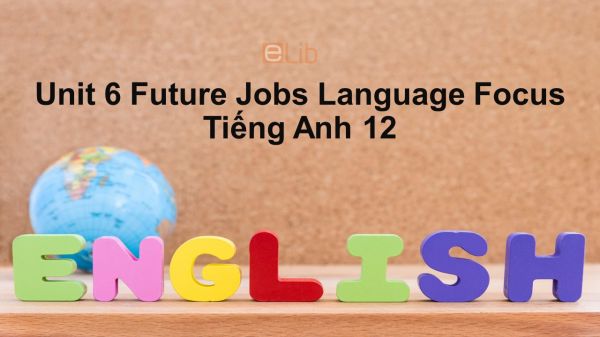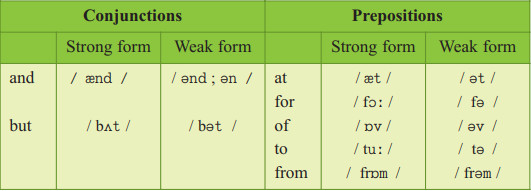Unit 6 lớp 12: Future Jobs-Language Focus
Bài học Unit 6 lớp 12 Future Jobs phần Language Focus giúp các em phân biệt cách đọc nhẹ và nhấn mạnh của một số từ nối và giới từ trong tiếng Anh. Trong phần ngữ pháp, bài học giúp các em ôn tập mệnh đề quan hệ.
Mục lục nội dung

1. Pronunciation Unit 6 lớp 12
Weak and strong forms of some conjunctions and prepositions (Dạng mạnh và yếu của 1 vài liên từ và giới từ)
Listen and repeat (Nghe và nhắc lại)

Practise reading these sentences (Luyện tập đọc những câu sau)
1. What are you looking at? (Bạn đang nhìn gì đó?)
2. I want to go but I don't know when. (Tôi muốn đi nhưng tôi không biết khi nào.)
3. She bought a book and two pens. (Cô mua một cuốn sách và hai cây viết.)
4. Thanks for coming. (Cảm ơn vì đã đến.)
5. Where is it from? (Nó từ đâu đến?)
6. I’m from Hanoi. (Tôi đến từ Hà Nội.)
7. She's the one I’m fond of. (Cô ấy là người mà tôi yêu thích.)
8. First of all, I want to thank you for coming. (Trước hết, tôi muốn cảm ơn bạn đã đến.)
9. The letter was to him, not from him. (Bức thư gửi cho anh ta, không phải từ anh ta.)
10. I want to ask you a question. (Tôi muốn hỏi bạn một câu hỏi.)
2. Grammar Unit 6 lớp 12
Grammar: Relative clauses (Mệnh đề quan hệ)
2.1. Exercise 1 Unit 6 lớp 12
Add who, whoever, whose, whom or which to complete the following sentences (Thêm who, whoever, whose, whom hoặc which để hoàn chỉnh các câu sau)
1. There is one person to………………I owe more than I can say.
⇒ There is one person to whom I owe more than I can say.
Tạm dịch
Có một người mà tôi chịu ơn nhiều hơn tôi có thể nói.
2. It was the kind of accident for……………..nobody was really to blame.
⇒ It was the kind of accident for which nobody was really to blame.
Tạm dịch
Đó là một loại tai nạn mà không ai có thể đổ lỗi.
3. ……………..leaves last should turn off the lights.
⇒ Whoever leaves last should turn off the lights.
Tạm dịch
Bất kể ai rời khỏi cuối cùng nên tắt đèn.
4. Mary was late yesterday,………………was unusual for her.
⇒ Mary was late yesterday, which was unusual for her.
Tạm dịch
Hôm qua Mary đã đến trễ, đó là điều bất thường đối với cô ấy.
5. At 6.00 pm,……………….was an hour before the plane was due, thick fog descended.
⇒ At 6.00 pm, which was an hour before the plane was due, thick fog descended.
Tạm dịch
Lúc 6 giờ chiều, là một giờ trước khi máy bay hạ cánh, sương mù dày đặc.
6. I don’t know………………told you that, but they were wrong.
⇒ I don’t know who told you that, but they were wrong.
Tạm dịch
Tôi không biết ai nói với bạn điều đó, nhưng họ đã sai.
7. Mrs Brown was the first owner ......... dog won three prizes in the same show.
⇒ Mrs Brown was the first owner whose dog won three prizes in the same show.
Tạm dịch
Bà Brown là chủ sở hữu đầu tiên mà con chó của bà đã giành được ba giải trong cùng chương trình.
8. I’ve just spoken to Sally, ............... sends you her love.
⇒ I’ve just spoken to Sally, who sends you her love.
Tạm dịch
Tôi đã nói chuyện với Sally, người mà dành tình yêu của cô ấy cho bạn.
9. On Sunday, ........... was my birthday, we went out for a meal.
⇒ On Sunday, which was my birthday, we went out for a meal.
Tạm dịch
Vào ngày Chủ nhật, đó là sinh nhật của tôi, chúng tôi đã đi ra ngoài để ăn.
10. The success of a shared holiday depends on …………………… you share it with.
⇒ The success of a shared holiday depends on whom you share it with.
Tạm dịch
Sự thành công của một kỳ nghỉ chia sẻ phụ thuộc vào bạn đi cùng với ai.
2.2. Exercise 2 Unit 6 lớp 12
Join the following sentences in two ways (Kết hợp những câu sau theo hai cách)
1. I read a book. It was written by a friend of mine.
⇒ a. I read a book that was written by a friend of mine.
⇒ b. I read a book written by a friend of mine.
Tạm dịch
Tôi đọc một quyển sách do một người bạn viết.
2. A man got on the bus. He was carrying a lot of money in a box.
⇒ a. A man who was carrying a lot of money in a box got on the bus.
⇒ b. A man carrying a lot of money in a box got on the bus.
Tạm dịch
Một người đàn ông mang rất nhiều tiền trong một hộp đã lên xe buýt.
3. In the street there were several people. They were waiting for the shop to open.
⇒ a. In the street there were several people who were waiting for the shop to open.
⇒ b. In the street, there were several people waiting for the shop to open.
Tạm dịch
Trên đường phố, đã có một vài người chờ đợi cửa hàng để mở.
4. Britain imports many cars. They were made in Japan.
⇒ a. Britain imports many cars which were made in Japan,
⇒ b. British imports many cars made in Japan.
Tạm dịch
a. Anh nhập khẩu nhiều loại xe được sản xuất tại Nhật Bản,
5. There are a lot of people in your office. They want to talk to you.
⇒ a. In your office there are a lot of people who want to talk to you.
⇒ b. In your office there are a lot of people wanting to talk to you.
Tạm dịch
Trong văn phòng của bạn có rất nhiều người muốn nói chuyện với bạn.
6. The cowboy fell off his horse. He had been wounded by an arrow.
⇒ a. The cowboy who had been wounded by an arrow fell off his horse,
⇒ b. The cowboy wounded by an arrow fell of his horse.
Tạm dịch
Người cao bồi bị thương bởi một mũi tên rơi xuống ngựa của mình.
7. Most of the people recovered quickly. They were injured in the crash.
⇒ a. Most of the people who were injured in the crash recovered quickly,
⇒ b. Most of the people injured in the crash recovered quickly.
Tạm dịch
Hầu hết những người bị thương trong vụ tai nạn đã hồi phục nhanh chóng.
8. John looked anxiously at his watch. He wished he hadn’t come to the party.
⇒ a. John, who wished he hadn’t come to the party, looked anxiously to his watch,
⇒ b. John, wishing he hadn’t come to the party, looked anxiously to his watch.
Tạm dịch
John, người không muốn đến dự bữa tiệc, lo lắng nhìn vào đồng hồ.
9. The children were playing football in the schoolyard. They were my students.
⇒ a. The children who were plavina foootball in the schoolyard were my students,
⇒ b. The children playing football in the schoolyard were my students.
Tạm dịch
Những đứa trẻ chơi bóng đá trong sân trường là những học sinh của tôi.
10. Vietnam exports a lot of rice. It is grown mainly in the south of the country.
⇒ a. Vietnam exports a lot of rice which is grown mainly in the south of the country,
⇒ b. Vietnam exports a lot of rice grown mainly in the south of the country.
Tạm dịch
Việt Nam xuất khẩu rất nhiều gạo chủ yếu ở miền Nam
3. Practice Task 1
Fill in the blanks with WHO, WHICH or THAT (Điền WHO, WHICH hoặc THAT vào chỗ trống)
1. The men _______ lives next-door are English.
2. The dictionary _______ you gave me is very good.
3. Do you know the girls _______ are standing outside the church?
4. The police are looking for the thieve _______ got into my house last night.
5. The chocolate _______ you like comes from the United States.
6. I have lost the necklace _______ my mother gave me on my birthday.
7. A burglar is someone _______ breaks into a house and steals things.
8. Buses _______ go to the airport run every half hour.
9. I can't find the key _______ opens this door.
10. I gave you a book _______ had many pictures.
11. I don't like the boy _______ Sue is going out with.
12. Did you see the beautiful dress _______ she wore yesterday.
13. The man _______ she is going to marry is very rich.
14. This is the bank _______ was robbed yesterday.
15. He wore a mask _______ made him look like Mickey Mouse.
4. Practice Task 2
Rewrite the sentences (Viết lại câu)
1. The first boy has just moved. He knows the truth.
.................................................. ...............................
2. I don't remember the man. You said you met him at the canteen last week.
.................................................. ............................................
3. The only thing is how to go home. It make me worried.
.................................................. ..........................................
4. The most beautiful girl lives city. I like her long hair very much.
.................................................. ............................................
5. He was Tom. I met him at the bar yesterday.
.................................................. ........................
6. The children often go swimming on Sundays. They have much free time then.
.................................................. .............................................
7. They are looking for the man and his dog. They have lost the way in the forest.
.................................................. .............................................
8. The tree has lovely flowers. The tree stands near the gate of my house.
.................................................. .........................................
9. My wife wants you to come to dinner. You were speaking to my wife
.................................................. ....................................
10. The last man has just returned from the farm. I want to talk to him at once.
.............................................
Để ôn tập lại các từ vựng về chủ đề "Future Jobs" và các điểm ngữ pháp đã học trước khi kết thúc Unit 6, mời các em làm bài trắc nghiệm Unit 6 Language Focus Tiếng Anh 12 sau đây.
6. Conclusion
Qua bài học này, các em cần khái quát điểm ngữ pháp quan trọng như sau
- Các dạng mệnh đề quan hệ trong tiếng Anh
- Có hai loại mệnh đề quan hệ: mệnh đề quan hệ xác định và mệnh đề quan hệ không xác định.
- Mệnh đề quan hệ xác định (Defining relative clauses): là mệnh đề được dùng để xác định danh từ đứng trước nó. Mệnh đề xác định là mệnh đề cần thiết cho ý nghĩa của câu, không có nó câu sẽ không đủ nghĩa. Nó được sử dụng khi danh từ là danh từ không xác định và không dùng dấu phẩy ngăn cách nó với mệnh đề chính.
- Mệnh đề quan hệ không xác định (Non-defining relative clauses): là mệnh đề cung cấp thêm thông tin về một người, một vật hoặc một sự việc đã được xác định. Mệnh đề không xác định là mệnh đề không nhất thiết phải có trong câu, không có nó câu vẫn đủ nghĩa. Nó được sử dụng khi danh từ là danh từ xác định và được ngăn cách với mệnh đề chính bằng một hoặc hai dấu phẩy (,) hay dấu gạch ngang (-)
Ex: Dalat, which I visited last summer, is very beautiful. (Non-defining relative clause)
Note: để biết khi nào dùng mệnh đề quan hệ không xác định, ta lưu ý các điểm sau:
- Khi danh từ mà nó bổ nghĩa là một danh từ riêng
- Khi danh từ mà nó bổ nghĩa là một tính từ sở hữu (my, his, her, their)
- Khi danh từ mà nó bổ nghĩa la một danh từ đi với this , that, these, those
- Phân loại các đại từ quan hệ trong tiếng Anh
WHO
- làm chủ từ trong mệnh đề quan hệ
- thay thế cho danh từ chỉ người.....
- Cấu trúc: N (person) + WHO + V + O
Ví dụ: I told you about the woman who lives next door.
WHOM
- làm túc từ cho động từ trong mệnh đề quan hệ
- thay thế cho danh từ chỉ người
- Cấu trúc: .....N (person) + WHOM + S + V
Ví dụ: I was invited by the professor whom I met at the conference.
WHICH
- làm chủ từ hoặc túc từ trong mệnh đề quan hệ
- thay thế cho danh từ chỉ vật
- Cấu trúc:
- ....N (thing) + WHICH + V + O
- ....N (thing) + WHICH + S + V
Ví dụ:
Do you see the cat which is lying on the roof?
He couldn’t read which surprised me
THAT
(có thể thay thế cho vị trí của who, whom, which trong mệnh đề quan hệ quan hệ xác định)
- Các trường hợp thường dùng "that":
- khi đi sau các hình thức so sánh nhất
- khi đi sau các từ: only, the first, the last
- khi danh từ đi trước bao gôm cả người và vật
- khi đi sau các đại từ bất định, đại từ phủ định, đại từ chỉ số lượng: no one, nobody, nothing, anyone, anything, anybody, someone, something, somebody, all, some, any, little, none.
- Ví dụ:
- He was the most interesting person that I have ever met.
- It was the first time that I heard of it.
- These books are all that my sister left me. 0983672757
- She talked about the people and places that she had visited.
- Các trường hợp không dùng that:
- trong mệnh đề quan hệ không xác định
- sau giới từ
WHOSE
- dùng để chỉ sở hữu cho danh từ chỉ người hoặc vật, thường thay cho các từ: her, his, their, hoặc hình thức 's
- Cấu trúc....N (person, thing) + WHOSE + N + V ....
Ví dụ: Do you know the boy whose mother is a nurse?
